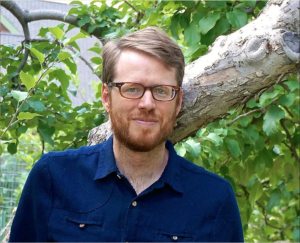By Christa Rodriguez || Campus Life Editor

Eric Puchner, author and this year’s judge of the Jerome Irving Bank Memorial Prize, gave a craft talk at the Philadelphia Alumni Writers House Reading Room on Thursday, March 30. He is the author of the story collection Music Through the Floor and the novel Model Home. He also has a new collection of stories, Last Day on Earth, which will be published in February 2017. In addition to writing, Puchner is also an assistant professor in the Writing Seminars at Johns Hopkins University. Later that night, Puchner gave a reading of his own work, followed by a question and answer period. The event also recognized this year’s Jerome Irving Bank Memorial Prize winner, Clarissa Grunwald ’17, and the runner ups Shristi Uprety ’17 and Teresa Norman ’19.
He introduced his craft talk with the concept of “creating astonishment in fiction.” These moments in stories, Puchner said, make the “hairs on the back of your neck start to stand up.” The main goal of his writing is to create this sense for readers. He said uncanniness is “built into the DNA of short stories,” such as Young Goodman Brown by Nathaniel Hawthorne. Puchner has pinpointed this uncanny feeling from stories to be a shift in perspective within the character or the story’s plot. Specifically, the shift in perspective away from the character’s point of view in the story to create a posthumous moment he calls the “Wakefield effect.”
This term was inspired by Nathaniel Hawthorne’s “Wakefield”. In this story, a man is tempted to leave his family for a night, and stays only a block away. However, he decides to stay away longer, and stays away from his family for 20 years, to the point where they think he is dead. To Puchner, this character “steps outside of his life,” like a ghost. He later returns home and sees his family without him through the window. This realization of what the world would look like if one was dead or if one was removed from it creates this uncanny feeling that Puchner admires as part of great storytelling. More modern stories tend to have more realism, but still have this quality of uncanniness.
He gave multiple other examples of stories that have this effect, including “Labor Day Dinner” by Alice Munro, “Emergency” by Denis Johnson, “Gusev” by Anton Chekhov, and The Age of Innocence by Edith Wharton. Puchner noted that this type of moment in a story, if done well, causes a de-familiarization, allowing the character as well as the reader to see the world afresh. To Puchner, the posthumous moment usually occurs at the end or at the climax, and is tied to the character’s desire and lack of achieving that desire.
Puchner said it is hard to teach astonishment in one’s writing. He pushed his own work towards the uncanny, saying some stories were more successful than others. Sometimes there is no reason for a character to be doing what they are doing, and, to Puchner, it is good to have characters take inscrutable actions. Often as individuals, we do not always know why we do what we do.
In response to a question from a student, Puchner stated that the Wakefield effect is astonishing to us because “we’re accustomed to being the center of the world,” and it allows for the possibility to increase our empathy. However, he does not feel pressure to have a moral to any of his stories. According to Puchner, a story has no obligation to teach, just to ask questions.
Sophomore Christa Rodriguez is the Campus Life Editor. Her email is crodrigu@fandm.edu.